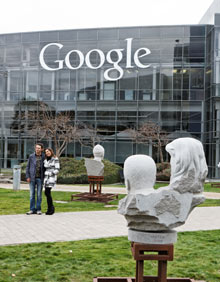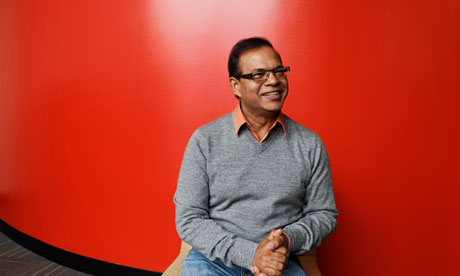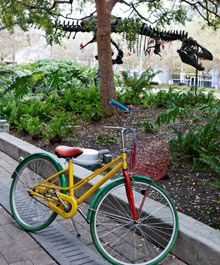Google spends $1 billion for new London headquarters
DVICE
Last weekend, Google
was busy sinking $200 million into a Texas wind farm. This week, the
giant is busy securing a new UK headquarters in central London. It
started by spending a cool $1 billion on a 2.4-acre plot to build said
headquarters. Not sure ...
See all stories on this topic »
Google and the future of search: Amit Singhal and the Knowledge Graph
Google
has revolutionised the way we holiday, shop, work and play. Now, with
Knowledge Graph, it plans to radically transform the way we search the
internet… again. But some voice qualms about the company's ambitions


Making connections: inside one of Google’s data centres, the Dalles, Oregon. Photograph: Google/Rex Features
Thinking about Google over the last week, I have fallen into the
typically procrastinatory habit of every so often typing the words
"what is" or "what" or "wha" into the Google search box at the top right
of my computer screen. Those prompts are all the omnipotent engine
needs to inform me of the current instant top 10 of the virtual world's
most urgent desires. At the time of typing, this list reads, in
descending order:
What is the fiscal cliff
What is my ip
What is obamacare
What is love
What is gluten
What is instagram
What does yolo mean
What is the illuminati
What is a good credit score
What is lupus
It
is a list that indicates anxieties, not least the ways in which we are
restlessly fixated with our money, our bodies and our technology – and
paranoid and confused in just about equal measure. A Prince Charles-like
desire for the definition of love, in my repetitive experience of the
last few days, always seems to come in at No 4 on this list of
priorities, though the preoccupations above it and below it tend to
shift slightly with the news.
The list also supports another
truism: that we – the billion components of the collective questioning
mind – have got used to asking Google pretty much anything and expecting
it to point us to some kind of satisfactory answer. It's long since
become the place most of us go for knowledge, possibly even,
desperately, for wisdom. And it is already almost inconceivable to
imagine how we might have gone about finding the answer to some of these
questions only 15 years ago without it – a visit to the library? To a
doctor? To Citizens Advice? To a shrink?
That was the time, in the
prehistory of about 1995, when our ideas of "search" still carried the
sense of the word's Latin roots – a search was a kind of "arduous quest"
that invariably involved "wandering" and "seeking" and "traversing".
Not any longer. For those who are growing up to search in this
millennium, it implies nothing more taxing than typing two words into a
box – or, increasingly, mumbling them into a phone – and waiting less
than an instant for a comprehensive answer, generally involving texts
and images and films and books and maps. Search's sense of questing
purpose has already gone the way of other pre-Google concepts, such as
"getting lost".
That rate of change – of how we gather
information, how we make connections and think – has been so rapid that
it invites a further urgent Google question. Where will search go next?
One answer to that question was provided by the billionaire double act
of Sergey Brin and Larry Page, Google's founders, in 2004, when pressed
about their vision of the future by the former Newsweek journalist Steven Levy.
"Search
will be included in people's brains," said Page of their ambition.
"When you think about something and don't really know much about it, you
will automatically get information."
"That's true," Brin
concurred. "Ultimately I view Google as a way to augment your brain with
the knowledge of the world. Right now, you go into your computer and
type a phrase, but you can imagine that it could be easier in the
future, that you can have just devices you talk into or you can have
computers that pay attention to what's going on around them…"
Page,
generally the wilder thinker, was adamant, though. "Eventually, you'll
have the implant, where if you think about a fact, it will just tell you
the answer."
Nine years on, Brin's vision at least is already
reality. In the past couple of years, a great advance in
voice-recognition technology has allowed you to talk to search apps –
notably on iPhone's Siri as well as Google's Jelly Bean – while Google Now, awarded 2012 innovation of the year,
will tell you what you want to know – traffic conditions, your team's
football scores, the weather – before you ask it, based on your location
and search history. Page's brain implants remain some way further off,
though both Google founders have lately been wearing "Google Glass"
prototypes, headbands that project a permanent screen on the edge of
your field of vision, with apps – cameras, search, whatever – answerable
to voice-activated command. Searching is ever more intimately related
to thinking.
 Outside Google HQ in Mountain View, California. Photograph: Donald Weber for the Observer
In this sense, the man who is, these days, in charge of the vast
majority of the world's questing and wandering and seeking and
traversing is called Amit Singhal. Aged 44, head of Google Search, he is
a boyishly enthusiastic presence, who inhabits a much-mythologised
office in Mountain View, California, somewhat in the way that the Wizard
of Oz lived at one end of the Yellow Brick Road. Singhal is the man who
pulls the levers that might just help you find a heart, or a brain, or
the way back to Kansas. For a dozen years, he has taken over
responsibility from Brin for writing and refining the closely guarded
algorithm – more than 200 separate coded equations – that powers
Google's endless trawl for answers through pretty much all of history's
recorded knowledge. So far, he has never stopped finding ways to make it
ever smarter and quicker.
Outside Google HQ in Mountain View, California. Photograph: Donald Weber for the Observer
In this sense, the man who is, these days, in charge of the vast
majority of the world's questing and wandering and seeking and
traversing is called Amit Singhal. Aged 44, head of Google Search, he is
a boyishly enthusiastic presence, who inhabits a much-mythologised
office in Mountain View, California, somewhat in the way that the Wizard
of Oz lived at one end of the Yellow Brick Road. Singhal is the man who
pulls the levers that might just help you find a heart, or a brain, or
the way back to Kansas. For a dozen years, he has taken over
responsibility from Brin for writing and refining the closely guarded
algorithm – more than 200 separate coded equations – that powers
Google's endless trawl for answers through pretty much all of history's
recorded knowledge. So far, he has never stopped finding ways to make it
ever smarter and quicker.
To find Singhal, I go through all those
by now second-nature travel preparations. I Google a hotel to stay at
nearby in Palo Alto, view the options, have a virtual look around a
couple before booking. I Google my flight times and check in. I Google a
car hire firm, find the cheapest on a comparison site, and choose a
car, and hook up to Google maps to plan the route of the 400 or so miles
I'll drive from Los Angeles northwards. I Google information about
where to park at the Googleplex, and Google the Street View of the walk I will make from the car to the right office building, past the replica T rex outside. I Google a few interviews Singhal has given in the past. And then a day or two later I do it all for real.
There
is something slightly disconcerting about the Mountain View Googleplex
itself, which I guess has a lot to do with finding yourself in the
physical space of so virtual an entity. At the end of last year, Google
published photographs of its vast and ever-growing data centres for the
first time. The images of our cloud of knowing were either inspiring or
terrifying, depending on your point of view. Endless banks of servers,
linked with primary coloured Google wiring, stretched as far as the eye
could imagine, a great outsourced brain thrumming in high-security
hangars in Oklahoma, Ohio and Georgia, fed by all the world's anxiety
and curiosity. The control centre of that unprecedented storage centre
could hardly be more open access, however.
You can wander around
the sprawling landscaped Googleplex campus or hop on a primary coloured
Google bike to cycle between buildings and nobody bothers you at all.
The Googleplex was conceived by Brin and Page to encourage geeks to be
sociable. It seems to work; it is overpopulated by a chatting and
mingling crowd of what seem like quite intense postgrad students who
look happy and healthy and are, though you would never quite guess it,
often jaw-droppingly rich. The site is full of free cafes, punctuated by
volleyball courts; every workspace has pool and table tennis tables;
you can visit a doctor or a dentist, get a haircut, get your dry
cleaning done, have a massage (Google's masseuse became a stock
millionaire), go to the gym.
It has book talks, movies and music
events – when I visit David Beckham had just been on site as a "guest
speaker". There are whiteboard walls everywhere full of algebra and
in-jokes; there is a learning space with classes in everything from
mindfulness to Greek myth. And of course lots of gadgets. In the foyer
is a mini wraparound Imax of
screens that allows you to key in a postcode and stand in any street in
the world. Fittingly, having Googled the way here, now I have arrived I
find myself standing outside my house in London again, exactly where I
was two days and a transatlantic flight earlier.
 Amit Singhal: 'The fascination with flying though galaxies and
talking to a computer that could answer any question was always there
for me.’ Photograph: Donald Weber for the Observer
Google's Mr Search, Amit Singhal, has likewise come a long way to get
here. He started out in a village in Uttar Pradesh in India, in a home
that for the first eight years of his life possessed no screen at all.
When one arrived in 1977, a black-and-white television, it carried for
Singhal, he tells me, all the magic of prophecy. "There were two kinds
of programmes," he recalls. "Programming for local farmers and reruns of
American series such as Star Trek." You don't really have to think too hard to imagine which of these programmes Singhal chose.
Amit Singhal: 'The fascination with flying though galaxies and
talking to a computer that could answer any question was always there
for me.’ Photograph: Donald Weber for the Observer
Google's Mr Search, Amit Singhal, has likewise come a long way to get
here. He started out in a village in Uttar Pradesh in India, in a home
that for the first eight years of his life possessed no screen at all.
When one arrived in 1977, a black-and-white television, it carried for
Singhal, he tells me, all the magic of prophecy. "There were two kinds
of programmes," he recalls. "Programming for local farmers and reruns of
American series such as Star Trek." You don't really have to think too hard to imagine which of these programmes Singhal chose.
"I watched way too much Star Trek,
to the extent that I could remember episodes by heart," he recalls with
a laugh, "and I deeply believe now that shaped my thinking. The
fascination with flying through galaxies and talking to a computer that
could answer any question was always there for me. But of course I never
imagined those problems would begin to be solved in my lifetime at
all."
Singhal found himself in any case in the right place at the
right time. He started studying the idea of search as a graduate in
America in 1991, the year the world wide web began making its
connections. He did a PhD and then ended up in the Bell laboratories at
AT&T. It was only when he came to Google in the millennium year,
however, that he experienced "a strange kind of discontinuity".
Everything that had seemed like science fiction all his life was
suddenly within his compass.
To prove that point, Singhal takes his Android
smartphone out of his pocket and, like Captain Kirk, talks into it.
"Google: what is the population of London?" he says. "The population of
London was 8.174 million in 2011," the carefully conversational voice
replies. "How tall is Justin Bieber?" he wonders. "Justin Bieber is 5ft
7in tall." Singhal looks at me with childlike glee. "If I had gone to
sleep 20 years ago and you had woken me up today and I heard that, I
would be thinking, yes! And where do I sign up to fly to another
galaxy?"
What he is demonstrating, however, he insists, is still
just the beginning. Google search is, he says, with evangelical zeal, on
the threshold of another epochal change in its fast-forward evolution.
Having searched for a decade or so using the original brilliant
principle of hierarchies of web-based links, the great primary coloured
knowledge domination machine has, Singhal suggests, "begun to learn how
to understand the real world of people, places and things".
To
answer his question about Justin Bieber, Google already has to know
quite a lot. It has to know Justin Bieber is a person and that tallness
means height. "So you have already got to get to the semantics of what
is being asked. But even that is not enough. Because beyond that there
is this huge mass of unstructured text that we know as the web. And you
cannot properly understand what was asked for without really
understanding how you are going to go about answering it."
Until
now, Google has been an unprecedented signposter of knowledge. It has
not "known" the answer to anything itself but it has had an awfully
clever way of directing you to exactly the place you can find out. In
some senses, that attribute is in the process of changing. This year,
Google will roll out what it calls its Knowledge Graph,
the closest any system has yet come to creating what Tim Berners-Lee,
originator of the web itself, called "the semantic web", the version
that had understanding as well as data, that could itself provide
answers, not links to answers.
 Inside Google HQ. Photograph: Donald Weber for the Observer
The Knowledge Graph is a database of the 500 million most searched
for people, places and things in the Google world. For each one of these
things, it has established a deep associative context that makes it
more than a string of words or a piece of data. Thus, when you type "10
Downing Street" into Google with Knowledge Graph, it responds to that
phrase not as any old address but much in the way you or I might respond
– with a string of real-world associations, prioritised in order of
most frequently asked questions.
Inside Google HQ. Photograph: Donald Weber for the Observer
The Knowledge Graph is a database of the 500 million most searched
for people, places and things in the Google world. For each one of these
things, it has established a deep associative context that makes it
more than a string of words or a piece of data. Thus, when you type "10
Downing Street" into Google with Knowledge Graph, it responds to that
phrase not as any old address but much in the way you or I might respond
– with a string of real-world associations, prioritised in order of
most frequently asked questions.
Five years ago, when John Battelle wrote his book The Search,
which is still the definitive history of the subject, he concluded by
imagining a future directly out of Isaac Asimov's science fiction. "All
collected data had come to a final end. Nothing was left to be
collected. But all collected data had yet to be completely correlated
and put together in all possible relationships. A timeless interval was
spent doing that."
Knowledge Graph, you might say, is the
beginning of that "timeless interval". Google has already come closer
than anyone could ever have imagined to the "nothing was left to be
collected" part of that equation. It is in searchable possession not
only of the trillions of pages of the world wide web, but it is well on
the way to photographing all the world's streets, of scanning all the
world's books, of collecting every video uploaded to the public internet, mostly on its own YouTube.
In recent years, it has been assiduously accumulating as much human
voice recording as possible, in all the languages and dialects under the
sun, in order to power its translation and voice recognition projects.
It is doing the same for face recognition in films and photographs. Not
to mention the barely used possibilities of the great mass of
information Google possesses regarding the interests and communications
and movements and search history of just about everyone with a phone or
an internet connection.
This data has been collected not just for
the purpose of feeding it back to us as accurately as possible, but also
for the wider purpose: of teaching Google how to think for itself.
Singhal has worked with what he calls "signals of salience" for the past
dozen years, finding ever more accurate text- and link-based methods of
making searches happen. But also, crucially, as these signals have
become ever more sophisticated, Singhal and his team have been able to
"observe the whole world interacting with the data, and with that we
were able to begin to do something else, which was to begin to make the
computer understand the context of what was being asked".
 Outside Google HQ. Photograph: Donald Weber for the Observer
The way in which this is done is quite simple. Search analysis is
divided into "long clicks" and "short clicks". A long click represents a
satisfied customer. A user performs a search, clicks through on a
result and remains on that site for a long time. They don't come back to
the result set immediately to click on another result or to refine
their query. A short click is the opposite of a long click. It occurs
when a user performs a search, clicks through on a result and quickly
comes back to the result set to click on an alternative result. It
represents a minor failure. We may think we are learning all the time
from Google, but by virtue of this ongoing trillion-click analysis, it
is learning far more from us.
Outside Google HQ. Photograph: Donald Weber for the Observer
The way in which this is done is quite simple. Search analysis is
divided into "long clicks" and "short clicks". A long click represents a
satisfied customer. A user performs a search, clicks through on a
result and remains on that site for a long time. They don't come back to
the result set immediately to click on another result or to refine
their query. A short click is the opposite of a long click. It occurs
when a user performs a search, clicks through on a result and quickly
comes back to the result set to click on an alternative result. It
represents a minor failure. We may think we are learning all the time
from Google, but by virtue of this ongoing trillion-click analysis, it
is learning far more from us.
In this way, as far back as 2002,
Singhal introduced a refinement based on Ludwig Wittgenstein's theory on
how the meaning of words is always influenced by context. Searches for
ambiguous terms began to look beyond the search terms for other related
words. So a phrase such as "hot dog" would be understood in relation to
mustard and baseball games, not overheated canines. "Nuance," he says
now, "is what makes us human."
I imagine, I say, that along the
way he has been assisted in this work by the human component. Presumably
we have got more precise in our search terms the more we have used
Google?
He sighs, somewhat wearily. "Actually," he says, "it works
the other way. The more accurate the machine gets, the lazier the
questions become. So actually our lives get harder." He had to work
especially hard to correct and understand spelling errors and analyse
synonyms. And all along the dream has been the old Star Trek
one of providing the right answer to what you think you want to know
even if you don't know quite how to phrase the question. To work like a
mind works, in other words. "The end game of this is we want to make it
as natural as possible a thought process," he says. "We are maniacally
focusing on the user to reduce every possible friction point between
them, their thoughts and the information they want to find." Getting
ever closer to Page's brain implants, in effect.
Knowledge Graph
is the first real demonstration of that prowess. It started a couple of
years ago when, Singhal says, "We ran into this tiny company called Metaweb,
which had, through a symphony of machines and humans, begun to perfect a
system to present real-world people, places and things in a computer
memory. The method seemed scalable. So we bought this company."
By
that point, Metawab had stored 12 million reference points. Over the
last two years, in its characteristic style, Google has quickly
accelerated that to "over 570 million references with 18 billion factual
connections between them". (This is a sizable number: by point of
comparison, the English version of Wikipedia has about 4 million pages.)
Google is in the process of launching Knowledge Graph in seven
languages and aiming to exhibit the same local intelligence in each.
Knowledge
Graph's project manager is Emily Moxley. She talks me though some of
this intelligence. It goes quite a long way beyond being able to
distinguish between an English query for football scores and an American
one. "In Japan for example," she says, "our analysis shows that people
want to know quite a lot about the blood type of film stars", so that
will be a prioritised part of the instant Knowledge Graph in that part
of the world.
Likewise, Japanese Googlers seemed short-click
frustrated that the search for sumo wrestling data was not as accurate
as it might be. "We worked on rectifying that," Moxley says. "We thought
at the very least we should be able to answer a certain depth of
queries." What kind of depth? "Somewhere at least in the most popular
tens of millions," she suggests.
More than that, Singhal wants to
be sure all aspects of the data are properly in harmony with your
desires. "If you wanted to find out about Dr Martin Luther King's 'I
have a dream speech'," he says, "you might want the text, you might want
a picture of him, but we guess that what you really want is a video
clip of him delivering the speech – so how to get that to the top
of your search." Again Knowledge Graph can deliver that; it starts to
know what you want to know.
In talking to Singhal, it is quite
easy to get caught up in the utopian possibilities of the technology and
quite easy, of course, to forget that Google has also created wealth
faster and more efficiently than any company in history; that it is
probably the most effective generator of advertising dollars ever
invented; and that a great deal of what it knows about us we might well
want it not to (an unease that might grow by association now that
Facebook has announced a search engine
of its own data, one that promises to be even more intimate in its
revelation of personal history than Google has ever dared to be).
 Inside Google HQ. Photograph: Donald Weber for the Observer
All the Google employees I speak to adopt the same kind of reflexive
flinch if you hint at any of this, if you suggest that their motives for
all this data gathering, this knowledge sharing, might be anything
other than pure. It is the same kind of "Why wouldn't you trust us?"
flinch that has powered the company's growth through loyalty and that
sees it refuse to reveal its own intimate search history even when
threatened, as it is currently by the European Union, to prove that it
does not artificially weight algorithmic results in favour of its own
products and commercial partners.
Inside Google HQ. Photograph: Donald Weber for the Observer
All the Google employees I speak to adopt the same kind of reflexive
flinch if you hint at any of this, if you suggest that their motives for
all this data gathering, this knowledge sharing, might be anything
other than pure. It is the same kind of "Why wouldn't you trust us?"
flinch that has powered the company's growth through loyalty and that
sees it refuse to reveal its own intimate search history even when
threatened, as it is currently by the European Union, to prove that it
does not artificially weight algorithmic results in favour of its own
products and commercial partners.
Singhal rejects all of this. He winces when I ask: "What's in it for Google?"
"We
are a search people," he says. "The thing that motivates me is to build
a search engine that will outdo all my previous creations. Simple as
that."
Further, he believes, as a statement of faith, "that all
information is empowering". One of his favourite examples comes from his
own family. Every year, Singhal returns to Uttar Pradesh and sees the
transformations that the mobile availability of all the world's
knowledge has brought. And most years his father comes over to
California. "My dad is a retired civil servant," Singhal says, "and when
he visited us he used to worry the whole time about returning home and
taking presents through customs where the rules about what you could
bring home were very complicated, and changing all the time, and he
would get harassed and asked a hundred questions.
"I remember 10
years ago when he was here I showed him how to Google 'Indian custom
regulations' and there it all was in black and white, up to the minute.
He printed it out and his chest all puffed out. As soon as he got home
he called me excitedly to say how he had presented the customs officer
with this bit of paper and told him how his gifts for his grandkids
complied with the letter of it. To which the customs officer replied,
'Welcome home, Mr Singhal!'"
Singhal could no doubt point to a
multitude of such examples. But what about the less measurable ways that
the ease of search has changed our lives? I ask. What about the ways in
which it has diminished the excitement of serendipity, the way that it
has made the personal experience of a chance encounter with knowledge so
much rarer?
Singhal has been working on that. The Knowledge Graph
will still return the results it thinks you most likely need, but down
the list it will have a randomised element; it will have chance built
into it, another way it might mimic the way we think. His current
obsession is in behavioural psychology; he has become an avid student of
the work of Daniel Kahneman. "I just love the way it details how human
beings feel when faced with choices and decisions, what makes you run
away when someone offers you 32 chocolates to choose from, but which
satisfies you when they only give you one chocolate."
How, I wonder, will Google incorporate that knowledge in its unending search?
"I
don't know exactly yet…" Singhal says brightly, leaving you in no doubt
of what might be his organisation's guiding mantra: he will soon. | | | |
|








沒有留言:
張貼留言